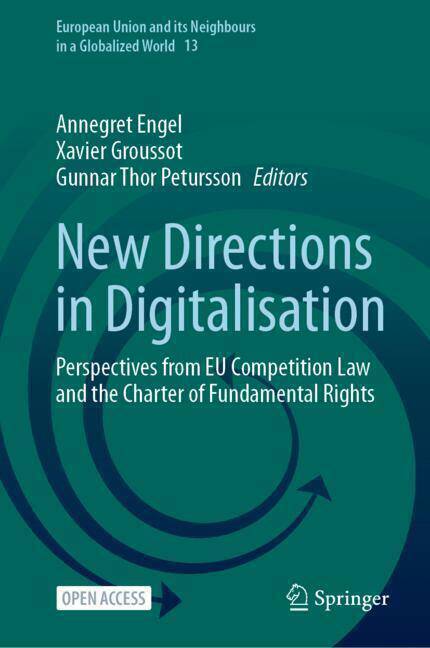
- Afhalen na 1 uur in een winkel met voorraad
- Gratis thuislevering in België vanaf € 30
- Ruim aanbod met 7 miljoen producten
- Afhalen na 1 uur in een winkel met voorraad
- Gratis thuislevering in België vanaf € 30
- Ruim aanbod met 7 miljoen producten
New Directions in Digitalisation
Perspectives from EU Competition Law and the Charter of Fundamental Rights
Omschrijving
This open access book brings together experts from both EU competition law as well fundamental rights backgrounds, discussing the most recent developments in EU legislation on digitalisation. Most prominently, it explores the recently introduced Digital Markets Act (DMA), including a discussion on other related legislative acts and the respective case law. It is aimed mostly at academics and researchers in the area of digitalisation, EU competition law, and the EU Charter, but will also provide some useful insights from practitioners in the field.
The internet has long been neglected and exempt from being regulated at EU level. In particular, this concerns the application of fundamental rights. The specific challenges for the digital sphere are numerous; worldwide scope, easy access, interoperability, rapid technological change, fluctuating market conditions, anonymity, disinformation, lack of traceability and thus enforcement, to name but a few. Fundamental EU values, in particular including democracy and the respect for human rights, have suffered as a direct result of these growing problems in the digital sphere. More recently, however, the EU has started to actively regulate the new technologies in order to avoid European values being undermined by an unregulated internet.
In the specific field of competition law, the development of new technologies has created many challenges and raised questions for the legislator how to regulate big market players: their cross-border nature, vicissitudes, and enormous market powers allow some of them to be able to escape legal scrutiny under the current set of ex-post rules. The DMA now introduces an ex-ante mechanism for competition law and claims to be aligned with the procedural and institutional rights granted under the Charter, which will be scrutinised and challenged by the various contributions in this book.
Specificaties
Betrokkenen
- Uitgeverij:
Inhoud
- Aantal bladzijden:
- 294
- Taal:
- Engels
- Reeks:
- Reeksnummer:
- nr. 13
Eigenschappen
- Productcode (EAN):
- 9783031653803
- Verschijningsdatum:
- 13/11/2024
- Uitvoering:
- Hardcover
- Formaat:
- Genaaid
- Afmetingen:
- 156 mm x 234 mm
- Gewicht:
- 598 g

Alleen bij Standaard Boekhandel
Beoordelingen
We publiceren alleen reviews die voldoen aan de voorwaarden voor reviews. Bekijk onze voorwaarden voor reviews.










